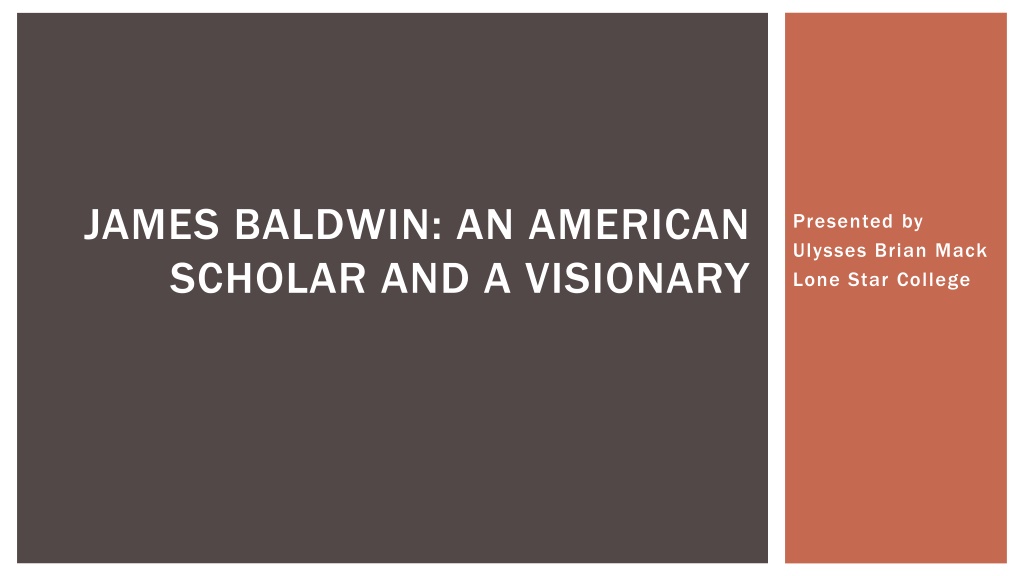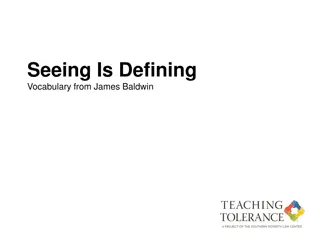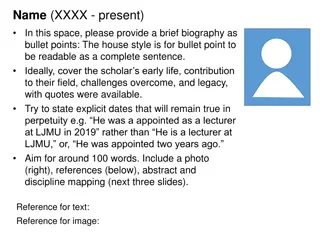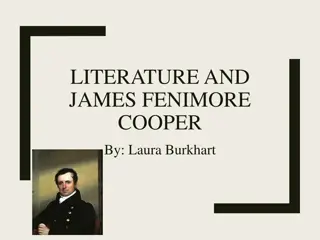James Baldwin - An American Scholar and Visionary
Writer and playwright James Baldwin, born in Harlem, New York, was a prominent figure exploring racial and social issues in his works. Known for essays on the Black experience in America, Baldwin produced various influential pieces like "Go Tell It on the Mountain," "The Fire Next Time," and "Another Country," which delved into themes of love, racism, and identity in society.
Download Presentation

Please find below an Image/Link to download the presentation.
The content on the website is provided AS IS for your information and personal use only. It may not be sold, licensed, or shared on other websites without obtaining consent from the author. Download presentation by click this link. If you encounter any issues during the download, it is possible that the publisher has removed the file from their server.
E N D
Presentation Transcript
JAMES BALDWIN: AN AMERICAN SCHOLAR AND A VISIONARY Presented by Ulysses Brian Mack Lone Star College
VIDEO A Glimpse: The Life and Works of James Baldwin A Glimpse: The Life and Works of James Baldwin https://youtu.be/1wxyQpV57Hk
Writer and playwright James Baldwin was born August 2, 1924, in Harlem, New York. One of the 20th century's greatest writers, Baldwin broke new literary ground with the exploration of racial and social issues in his many works. He was especially well known for his essays on the black experience in America.
Go Tell It on the Mountain (semi-autobiographical novel; 1953) The Amen Corner (play; 1954) Notes of a Native Son (essays; 1955) Giovanni's Room (novel; 1956) Nobody Knows My Name: More Notes of a Native Son (essays; 1961) Another Country (novel; 1962) A Talk to Teachers (essay; 1963) The Fire Next Time (essays; 1963) Blues for Mister Charlie (play; 1964) Going to Meet the Man (stories; 1965) Tell Me How Long the Train's Been Gone (novel; 1968) No Name in the Street (essays; 1972) If Beale Street Could Talk (novel; 1974) The Devil Finds Work (essays; 1976) Just Above My Head (novel; 1979) Jimmy's Blues (poems; 1983) The Evidence of Things Not Seen (essays; 1985) The Price of the Ticket (essays; 1985)
<Youtube Video JAMES BALDWIN ON MALCOLM X (1 of 3) JAMES BALDWIN ON MALCOLM X (1 of 3) https://youtu.be/Rt-WgwFEUNQ
Another Country- Another Country tells the stories of artists, mainly in New York, struggling to love and be loved amid the complexities of racism, sexism, and homophobia. James Baldwin divided the novel into three parts. Book One: Easy Rider begins by narrating the last day of Rufus Scott s life in a November in the late 1950 s, with digressions that show how he has come to the point of suicide. Then it shows his white friends responding to his death. This book ends the following March, when Vivaldo Moore begins an affair with Ida Scott. Book Two: Any Day Now opens with Eric Jones and Yves in southern France, and then follows Eric to New York in early summer, where he renews old friendships. During the summer, Cass and Richard Silenski s marriage comes apart, Cass begins an affair with Eric, and Vivaldo and Ida s relationship unravels. This book ends with Cass s confession to Richard, which brings an end to her affair; though very painful for both of them, the episode seems to hold the promise of a renewal of their marriage. Book Three: Toward Bethlehem opens with Vivaldo and Eric making love. This event brings the love between these two men into the open and releases them into new understandings of themselves and of the nature of love. Vivaldo confirms that he is not homosexual, but also that he need not be afraid of loving a male friend and expressing this love physically.
Notes of a Native Son- Notes of a Native Son is a collection of essays published previously in various periodicals. Though not originally written to be published together, they share Baldwin s concerns over the resolution of the United States racial dilemma and the question of American identity. The first group of essays focuses on the black person as artist and on his or her image within the cultural canon. In Everybody s Protest Novel, Baldwin, once an enthusiastic fan of Harriet Beecher Stowe, labels her an impassioned pamphleteer and criticizes Uncle Tom s Cabin and other protest novels, including Richard Wright s Native Son, for falling short of their lofty aims, abusing language, and overtaxing credibility. Baldwin goes on in the second essay, Many Thousands Gone, to recognize Native Son as a literary landmark but questions its actual power, given the depersonalization and mythification of blacks as Uncle Tom and Aunt Jemima. In essence, the native son is a monster created by American history, and it is American history that must confront and re-create him. The third essay in the group, Carmen Jones: The Dark Is Light Enough, criticizes an all-black production of a theatrical standard for perpetuating racial stereotypes. The second group focuses on the sociopolitical scene. The Harlem Ghetto, the earliest of the essays, documents the congestion and claustrophobia of 1948 Harlem. Baldwin considers token civic improvements playgrounds and housing projects to be at best superficial and at worst injurious. The position of black leaders is impossible, the black press merely models itself on downtown counterparts, and the popularity of churches only reflects the pervasive hopelessness.
In Go Tell It on the Mountain, author James Baldwin describes the course of the fourteenth birthday of John Grimes in Harlem, 1935. Baldwin also uses extended flashback episodes to recount the lives of John's parents and aunt and to link this urban boy in the North to his slave grandmother in an earlier South. The title Go Tell It on the Mountain comes from a Negro spiritual. The novel is steeped in the language of the King James Bible, and the Bible is a constant presence in the characters' lives; thus, a familiarity with Biblical stories can enhance the reader's understanding of the text. At the heart of the story three main conflicts intertwine: a clash between father and son, a coming-of-age struggle, and a religious crisis. Baldwin deals with issues of race and racism more elliptically in this novel than in his other works, but these issues inform all three of the text's central problems indeed, according to some critics, these issues take center stage in the book, though subtly.
The thing that makes Baldwin a prolific writer is his address issues that were and still are relevant such as: Another Country- Bisexuality, Homosexuality, Interracial relationships, suicide, and prejudice Notes of a Native Son- American destiny, Racism, Social connection through music, and African American protest Go Tell it on the Mountain- Symbolic translation of societal views between the north and the south( ex. The confederate flag debate)























